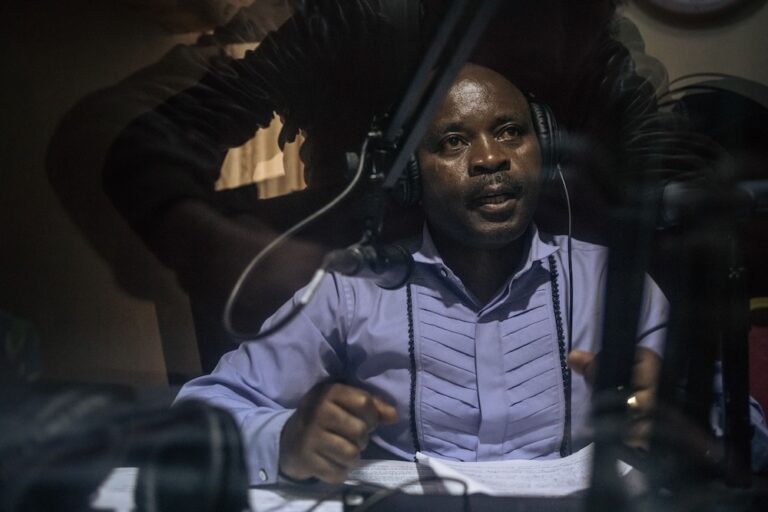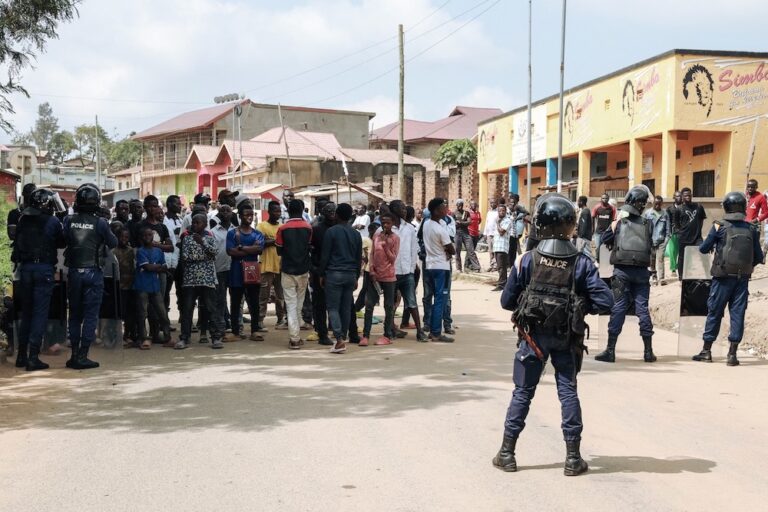(JED/IFEX) – The following is a 7 March 2001 JED press release: RTKM case: the minister of communications and his secretary-general contradict each other 1. Journaliste en danger (JED), a non-governmental organisation for the defence and promotion of press freedom, has read in the press the detailed notice pronounced by the minister of commnunications on […]
(JED/IFEX) – The following is a 7 March 2001 JED press release:
RTKM case: the minister of communications and his secretary-general contradict each other
1. Journaliste en danger (JED), a non-governmental organisation for the defence and promotion of press freedom, has read in the press the detailed notice pronounced by the minister of commnunications on 5 March 2001, at the Régideso meeting room, on the occasion of the meeting between the national press and the minister of human rights, in the context of preparations for the National Conference on Human Rights.
2. Speaking of the RTKM and Canal Kin affair, the minister of communications said: “First of all, when the President of the Republic, Mzee Laurent-Désiré Kabila was alive, the government of national salvation reached the following conclusion: Canal Kin and RTKM are the priorities of opponents, in open rebellion against the government. With our country at war, these radio and television stations should no longer operate. But because the former Canal Kin and the former RTKM employ fellow countrymen, in order to save their jobs, the government of national salvation took measures to save the radio and television stations and place them under the Ministry of Communications’ supervision and responsibility, until the war’s end. Secondly, when the war ends, the government chosen through democratic, free and transparent elections will determine the future of these radio and television stations. This is what we mean when we speak of measures taken regarding the former Canal Kin and former RTKM, for political reasons. In other words, contrary to circulating rumours, the stations were neither confiscated nor nationalised.”
3. Concerning RTKM in particular, JED has come to the conclusion that the stated grievances which led to the station’s placement under the Ministry of Communications’ supervision and the renaming of the station have clearly changed over time. The official documents regarding the above-noted decisions make no mention of the grievances listed by the minister of communications in his recent statement at the Régideso. Though ministers make decisions by decree, in its investigation of the RTKM affair, JED has found no decree or official letter about “the properties of opponents, in open rebellion against the government”.
4. However, JED does have a copy of letter no. 041/MC/SG/T.W/0155/2000, dated 22 September 2000 and signed by Mr. Bagalama Ka Yange, the Ministry of Communications’ secretary-general. The letter was intended for “the gentleman responsible for the RTKM radio station and the TKM television station,” and was sent to the minister of communications, the state prosecutor, the city of Kinshasa’s governor, RTNC’s interim president-general manager and the director-service head of audiovisual works. Its purpose is the: “Placement of your stations and channels (RTKM – TKM) under the Ministry of Communications’ supervision”. The letter includes the following statement: “By decision of the government of national salvation, I take it upon myself to bring to your attention the fact that RTKM radio station and TKM television station are placed under the Ministry of Communications’ supervision, for the simple reason that the funds used to acquire equipment for the stations came from the public treasury”.
5. This letter by the Ministry of Communications’ secretary-general preceded the minister of communications’ order no. 04/MC/0004/2000 of 14 October 2000, placing the audiovisual companies’ under his ministry’s supervision. Paragraph 5 of the order stipulates that: “Considering that the government of national salvation has decided to place the following audiovisual companies under the Ministry of Communications’ supervision,…”. Through which legal or administrative action did the government take the decision to place RTKM under supervision?
6. With regard to the renaming of the stations, a letter written by Mr. Bagalama Ka Yange, the Ministry of Communications’ secretary-general, dated 30 October 2000, and identified as no. 041/MC/SG/TW/0265/2000, adressed to Mr. Kasonga Mbunga, TKM’s official representative, states: “By instruction of the Head of State, His Excellency the Minister of Communications informs you, through his secretary-general that the TKM television station, placed under the Ministry’s supervision, will herein be named RTNC 4”. In a lawful state, and in the name of the public’s right to be informed of the management of the res publica, legal and administrative acts exist by which the state administrators take decisions in the nation’s interest.
7. In consideration of all the facts noted above, JED believes:
– that there is a flagrant contradiction between the statements of the minister of communications and the secretary-general of this same ministry – who claims to speak for the minister – concerning the motives which led to the private RTKM station’s placement under state supervision and its renaming, in the absence of a decision by the courts and tribunals, who have sole authority, in a lawful state, to recognise infractions and pronounce sentences. Consequently, this does not constitute a rumour;
– that the establishment of a link between the RTKM scandal and the state of war or rebellion in the country is not a plausible justification, after the fact, for a violation of the Democratic Republic of Congo’s laws and our country’s international commitments with regard to the presumption of innocence, the right to private property, the right to a fair trial and freedom of expression;
– that the organisation’s intention is not to defend a “presumed misappropriation of public funds or a rebel” but rather to establish the truth based on the Ministry of Communications’ archives and the background to what can herein be termed the RTKM affair. The Congolese people, in whose name all our leaders speak, have a right to know the truth.
Kinshasa, 7 March 2001
FOR THE DIRECTING COMMITTEE
Roger Kahilu Huyen Ba
Communications Director


